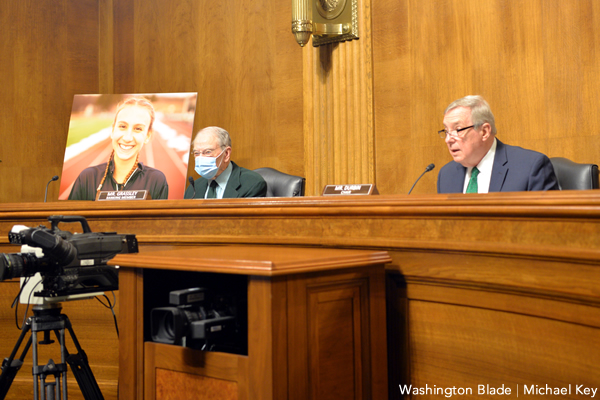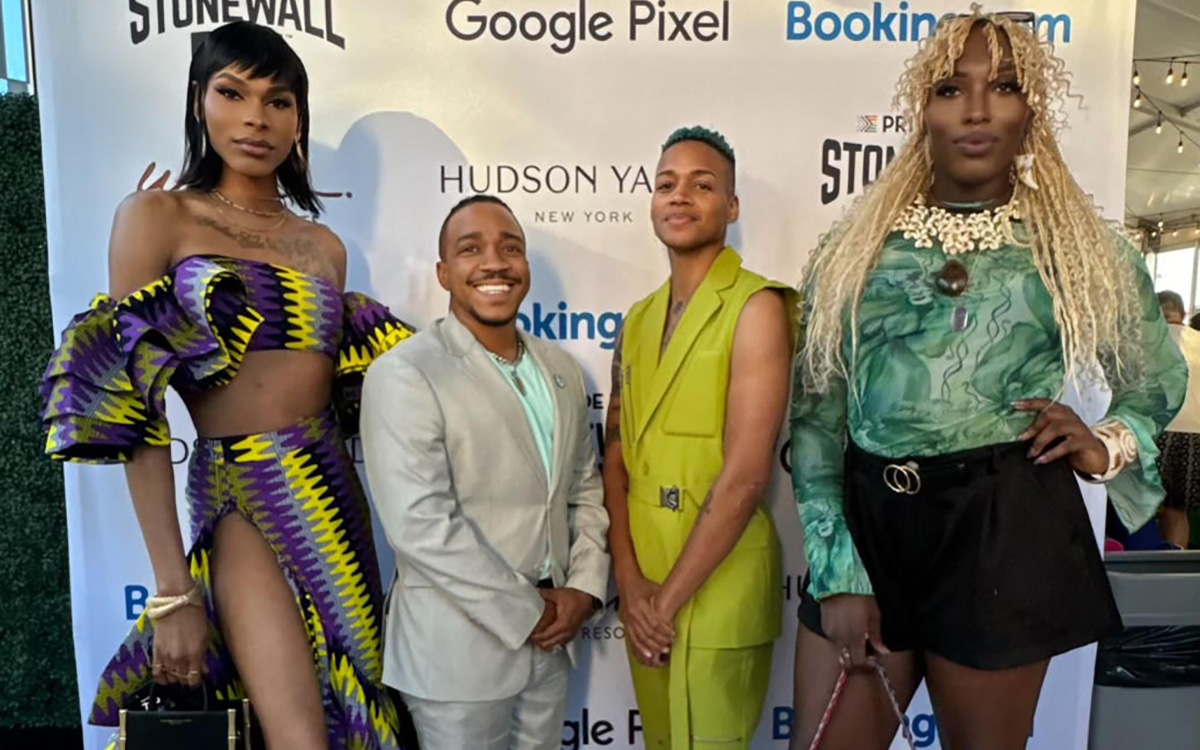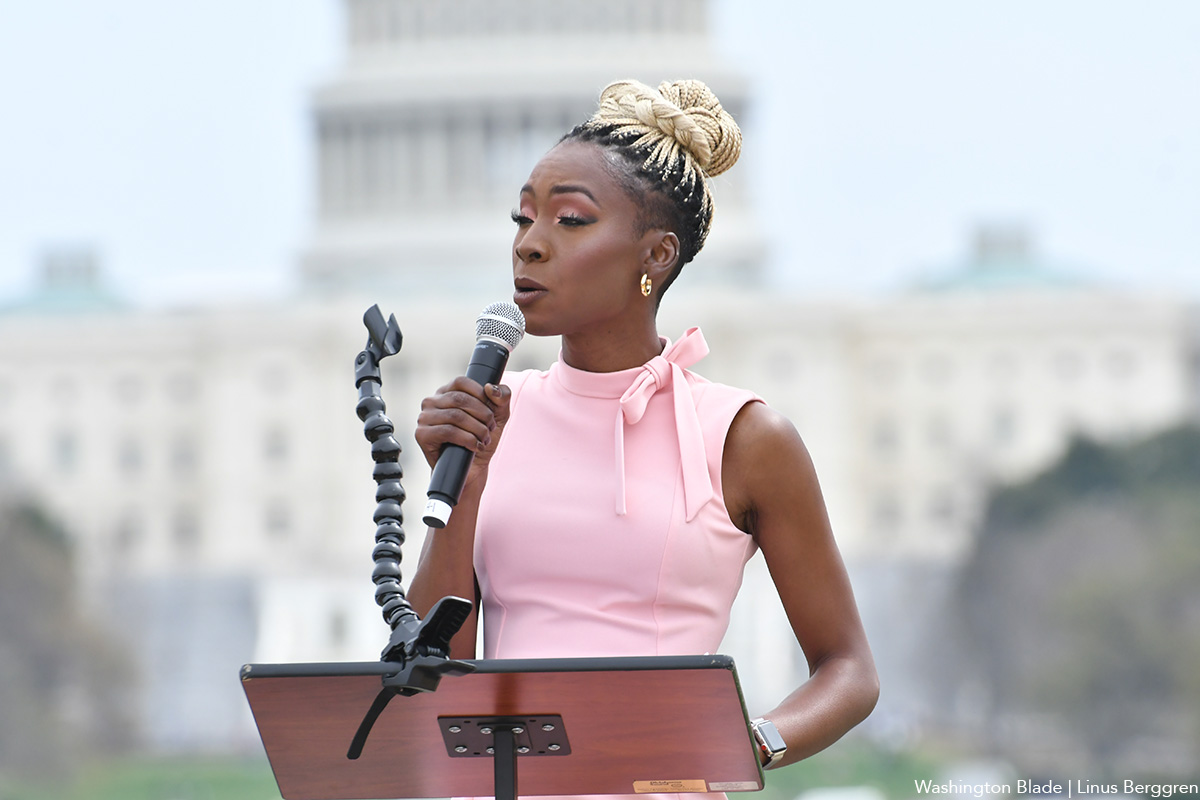News
Fears over women’s safety made wedge issue in Equality Act hearing


A Senate hearing on the Equality Act, which would expand the prohibition on discrimination under federal law, put on full display Wednesday the use of fear mongering about women’s safety and the integrity of women’s sports as a tool to thwart attempted progress on LGBTQ rights, although more traditional objections based on religious liberty also played a role.
Sen. John Kennedy (R-La.) pulled no punches during the Senate Judiciary Committee hearing — the first-ever hearing for the Equality Act in the U.S. Senate — in heightening fears about threats to women in sex-segregated spaces.
When Abigail Shrier, a journalist who has built a career campaigning against gender transitioning for youth, was presenting testimony as an expert witness, Kennedy went straight to the locker rooms.
“Would this bill prohibit the boy with gender dysphoria from exposing his penis to the girls?” Kennedy asked.
The questioning put Shrier, who was testifying against the Equality Act, in a bind. The Equality Act does prohibit discrimination on the basis of gender identity in locker rooms, but says nothing about that particular issue and laws against lewd conduct are in place. “I’m sorry would it prohibit that?”
When Kennedy repeated the questions, Shrier replied, “I don’t believe the bill addresses genitalia.” Kennedy went to ask her if it prohibits them from dressing together. “No,” Shrier replied. “Would this bill prohibit them from showering together?” “No.” Kennedy then asked about boys being able to access girls’ sports.
“He wouldn’t have to have gender dysphoria,” Shrier said. “Anyone who says they’re a girl at any time under this bill, they don’t have to be transgender-identified, they don’t have to have gender dysphoria.”
Kennedy said he had intended to get to that point and asked her if the Equality Act would require schools to allow boys with gender dysphoria to compete in girls’ sports. Shrier replied, “Yes, anyone who identifies as a woman.”
Sen. Charles Grassley (R-Iowa), top Republican on the committee, brought up a specific incident in Connecticut where transgender girls were allowed to compete in a girls track event. Grassley named one of the girls who filed a complaint over the situation, Chelsea Mitchell, as he displayed images of three girls involved behind him.
“Many women and girls before her fought for legal protections under Title IX, which recognizes that sex specific distinctions are appropriate in some instances,” Grassley said. “As a father, grandfather and husband, I have celebrated the athletic successes of talented young women in my own family, so I am deeply concerned about this act’s potential negative implications for all girls and women in sports.”
The Equality Act says nothing about sports, but would prohibit discrimination against transgender people in education and federally funded programs. It should be noted the ruling last year from the U.S. Supreme Court in Bostock v. Clayton County, which found anti-LGBTQ discrimination is an illegal form of sex discrimination, has broad applications, including for Title IX of the Education Amendment of 1972, which bars discrimination on the basis of sex in sports. As a result, refusing to allow transgender kids in sports would likely already be illegal.
Fears of the impact of LGBTQ rights advances on religious practices also came up during the hearing. Sen. Mike Lee (R-Utah), for example, raised a question about whether churches that conduct services with members of the congregation divided by sex would be liable as a public accommodation under the Equality Act.
Mary Rice Hasson, a fellow in Catholic Studies at the Ethics & Public Policy Center, served as a Republican witness and maintained churches could be held liable under the Equality Act “by expanding public accommodations to mean wherever Americans gather, even virtually.”
“Compromise your religious beliefs or risk endless litigation,” Hasson said. “Recipients of federal funds are also targeted, even for the simple act of maintaining sex segregated bathrooms.”
HRC President Alphonso David, responding to an earlier question from Sen. Richard Durbin (D-Ill.), contested the idea that churches would be liable, which would be consistent with the religious exemption the Equality Act would retain under the Civil Rights Act of 1964.
“The Equality Act does not affect how religious institutions function,” David said. “That is very different than institutions that actually provide public accommodations, institutions that are open to the public and are providing goods and services to the public.”
A major issue of contention was a provision of the Equality Act that would preclude the use of the 1993 Religious Freedom Restoration Act, a law intended to protect religious minorities, as a potential legal defense in cases of discrimination. Scolding Republican critics who indicated the Equality Act would gut RFRA, Sen. Richard Blumenthal (D-Conn.) said the bill does nothing of the sort, but Sen. Josh Hawley (R-Mo.) shot back there was “an explicit carve out in the Equality Act for RFRA.”
“I’m aware of no other law that seeks to shred RFRA in this way, and the effect of it basically is that churches, religious ministries, Christian colleges and universities, they’ll be unable to pursue their missions, particularly if they involve service to the poor, service to the needy,” Hawley said.
During a hearing in which Democratic members of the committee largely focused on their witnesses and Republicans stuck with theirs, Kennedy was an exception and asked David if there are more than two sexes. David initially deferred to medical experts and noted sex and gender can be different concepts, but then concluded “it’s not limited to two,” citing for example people who are intersex.
Shrier made an attempt during the hearing to qualify her opposition to the Equality Act, saying her opposition is based on potential consequences of the bill on women’s safety.
“If S. 393 merely proposed to extend employment, and public housing rights to gay and transgender Americans, I would be supporting this bill, instead of testifying against it,” Shrier said. “I am here today because the bill does much more, and no one who wrote it appears to have thoughtfully considered what it would mean for women and girls.”
Tillis open to ‘compromise’ on LGBTQ rights
Despite the issues raised by Republicans, one key moment came when Sen. Thom Tillis (R-N.C.), whose vote would be key to reaching the 60-vote threshold to end a Senate filibuster on the Equality Act, appeared to make a good faith effort to reach across the aisle.
“On the one hand, we have the fact that even in 2021, our LGBTQ friends, family, neighbors, still face discrimination from employment to healthcare to housing to homelessness among LGBTQ youth is a very real problem with discrimination,” Tillis said. “I think it’s wrong, in any aspect. But on the other hand, we have millions of Americans who are people of faith who have serious and legitimate issues of conscience.”
Although Tillis said the Equality Act “falls short of the goal” he seeks in addressing both sides, he added he’s “open to finding a compromise.” The last committee member to ask questions during the hearing, Tillis also lamented members of the committee “were talking past one another” about their concerns without coming closer to an ultimate conclusion.
Two issues that appeared to concern Tillis were the provision in the Equality Act against use of RFRA in cases of discrimination and whether the Equality Act’s ban on LGBTQ discrimination in federally funded programs would require prisons to house transgender women consistent with their gender identity. Tillis posed a question on whether a male serial rapist could say he identified as a woman and be allowed in women’s prisons; Shrier said that “absolutely” would be the case.
Meanwhile, proponents of the Equality Act continued to make their case for the bill based on its general objectives, to ban anti-LGBTQ discrimination in all aspects of public life.
Durbin, kicking off the committee hearing, displayed a video highlighting milestones in the LGBTQ movement, including the election of Harvey Milk and the swearing-in of Pete Buttigieg, as well as media coverage on passage in the U.S. House of the Equality Act.
“Unfortunately, some opponents have chosen to make exaggerated claims about what the Equality Act would do,” Durbin said. “Let me be clear, those of us working to pass this legislation are open to good faith constructive suggestions on further improvement and strengthening the bill. In fact, that’s why we’re having this hearing, but many of the texts on this bill are nothing more than the latest in a long, long, long line of fear mongering targeting the LGBTQ community.”
Stella Keating, a 16-year-old student from Tacoma, Wash., made the case for the Equality Act as a witness in the simplest way possible: Introducing herself as a transgender person.
“Hi, I’m Stella, and I’m transgender,” Keating said, “I’m here before you today, representing the hundreds of thousands of kids, just like me who are supported and loved by their family, friends, and communities across the country.”

It is common knowledge that women earn 84% of the average worker. Less common knowledge? Trans women earn 60% of the average worker. Trans men and non-binary people come in at around 70%, while 16% of all trans people make less than $10,000 annually.
E.C. Pizarro was lucky, and he knew it. He had a BFA in graphic design and had taught himself how to code. As a stealth trans man in a corporate job, he had access to a stable wage and good benefits. “People that do not have experiences in corporate America or with equitable employment don’t realize [these things] are privileges that a lot of people don’t have access to.”
He wanted to give back and was gearing up to bring more volunteer work into his life by participating in a fraternity for trans men. When he went to a TransTech event and learned about the educational and career resources for trans people who face barriers to entering the workforce, he knew he had found his place.
At the event he met, Angelica Ross. Yes, that Angelica Ross, of “Pose” and “American Horror Story.”
Before she was Candy, Ross was a self-taught coder. She went from posing for an adult website to doing its back-end coding to teaching her trans siblings how to succeed in tech.
“Technology was the key to my freedom,” Ross said in an interview with The Plug. “Technology took me from being exploited on someone’s website to building my own websites and to building websites for other people and getting paid to do so.”
Pizarro was impressed and wanted to help. “I went up to Angelica and I was like ‘Hey, I’m a trans man. These are my skills. I’m down to volunteer and do any type of work—the one caveat is that I’m stealth. You can’t tell anybody that I’m trans.’”
For four years, Pizarro helped from mostly behind the scenes, sometimes getting side-eyed since people thought he was a cis man in trans spaces. “I was still stealth as the Director of Social Media and Communications for the National Trans Visibility March in 2019,” Pizarro says, chuckling a little.
But by that point, Ross — who headlined the 2019 march — was overextended trying to balance being a world-famous actress, advocate, and businesswoman.
She needed someone to step in as executive director of TransTech and looked to the group of dedicated volunteers. Pizarro was elected by his peers to take the reins of the organization.
This was a turning point for Pizarro. “I’m very passionate about tech and for me a small sacrifice of being open with my trans experience to liberate other trans people,” he said. “I felt like if that’s something I got to do, then I’m gonna do it.”
And he did it. The infrastructure Ross put together worked: with mentorship, education, community, and networking with trans-accepting employers, trans people were gaining financial security and independence.
So, Pizarro focused on expanding TransTech as widely as possible. “We have grown exponentially over the last three years,” he says. “When I took over in 2021, we had about 800 members based in the United States. Now we support over 6,700 members across 50 countries.”
TransTech is filling a demonstrated need within specifically the trans community. New research from LGBT Tech found that 68% of transgender adults use the internet to find LGBTQ-friendly employment (compared to 38% of cisgender LGBTQ+ adults). More than 70% of all LGBTQ adults use the Internet to access educational content.
Accessibility is central to the TransTech programming. Despite the growth, everything remains free. “There’s no membership fee. All of our programming is free. All of the certifications and educational resources are free,” Pizarro says.
They know the financial burden the trans community faces — 29% of trans adults live in poverty. “If we’re asking anyone to up-skill [for a cost] and these are the things they are going through, we are asking them to invest in their future versus their meal today.”
Pizarro believes that accessibility is more than just making the training free. He wants the community to understand that tech work is something they are innately capable of doing.
“TransTech was built on the foundation of nontraditional tech. It’s not always coding. It’s graphic design. It’s social media. It’s video editing. It’s anything that uses a piece of technology and nowadays almost everything uses a piece of technology,” says Pizarro.
He emphasizes to participants: “You’re in tech and you don’t even know it,” pointing out how many already utilize tech skills like marketing and monetization with their social media accounts.
Some people involved in the programming are nervous about entering the “tech world” because of headlines about tech layoffs. He makes sure to emphasize that unlike in some other jobs, tech companies often pay generous severance packages, which gives employees “breathing room.” Pizzaro explains that “once you have experience with one tech company, you can go someplace else and make a substantial amount of money as well.”
While TransTech is designed for the gender-diverse community, the programming is open to everyone Pizarro explains. “We just ask that you don’t be transphobic.” (Or any of the other -phobics too, he says, listing them off.) He also emphasizes that this allows trans members who are not out to comfortably participate.
Pizarro wants everyone to understand that they don’t just belong in tech, but they make tech better. “Tech is most profitable when you have diverse people building the tech and using the tech,” Pizarro says. “There is an intentional funding as well as support to diversity tech because they understand how that impacts the product.”
He also reminds participants that they have developed transferrable skills in every part of their lives. “I like to tell people if you can manage your life as a trans person in the United States or anywhere you can manage a project.”

District of Columbia
Fire by arson forced temporary shutdown of Glorious Health Club
Spa and art gallery catering to gay
men expects to reopen in August

In a little noticed development, D.C.’s Glorious Health Club, which bills itself as a spa, art gallery, and community center catering to gay men, was forced to close on May 19 after one or more unidentified suspects ignited a fire inside the club that D.C. fire department officials have ruled an act of arson.
Robert Siegel, the club’s owner, told the Washington Blade that he and investigators with the D.C. Fire and Emergency Medical Services Department believe one or more yet unidentified suspects broke into the kitchen of the former warehouse building where the club is located at 2120 West Virginia Ave., N.E.
According to Siegel, investigators with the fire department’s arson squad believe a flammable liquid was used to start the fire in the kitchen and in two other locations within the building.
“Three separate fires were started,” Siegel said. “They started one on a staircase and one on the upstairs storage area,” he said in addition to the one in the kitchen. He said about 40 patrons were in the club at the time the fire started, and all were able to leave without injury.
Siegel said the fire caused $500,000 worth of damage to his building, with some of the damage caused — understandably he said — by fire fighters who had to rip open doors and break through the roof to gain access to the flames that engulfed parts of the interior of the building. He said he arranged for repair work to begin after the fire was extinguished.
“I expect we’ll be reopening in about a month from now,” he said. “And we’ll be a bigger and better place.”
Fortunately, Siegel said, most of the artwork and art exhibits located in the club were not damaged.
“It was basically the kitchen, patio, and the roof,” he said, adding that much of the solar panels he had on the roof were destroyed by the fire or by firefighters seeking to gain access to the building.
“And the fire was so hot it did structural damage to the roof,” he said. “It actually melted steel. We’re talking about 50-foot steel beams that have to be replaced,” he told the Blade. “That’s $100,000 right there.”
Vito Maggiolo, a spokesperson for the D.C. Fire and Emergency Medical Services Department, said the fire was “ruled incendiary/arson” and is “under active investigation.”
It could not immediately be determined if one or more people responsible for the fire targeted the Glorious Health Club because it’s a gay community establishment.
South America
Chilean capital Pride parade participants, activists attacked
Men wearing hoodies disrupted June 29 event in Santiago

A group of hooded men on June 29 attacked LGBTQ activists and others who participated in the Chilean capital’s annual Pride parade.
Witnesses said the men punched and kicked activists and parade participants, threatened them with a skateboard, threw stones and paint at floats and damaged parade infrastructure. The men also broke a truck’s headlight.
The Movement for Homosexual Integration and Liberation, a Chilean LGBTQ rights group known by the acronym Movilh, strongly condemned the acts of violence, calling them deliberate attempts to disrupt a peaceful and safe demonstration.
“Vandalism that seeks to transgress the peaceful trajectory of our demonstrations and that is only useful to the interests of the homo/transphobic sectors,” denounced Movilh.
The attack occurred when the hooded men tried to break through the security fence protecting the participants and the truck that was at the beginning of the parade.
“As we do every year, we fence the truck with our volunteers to prevent anyone from being run over or hurt by the wheels,” said Movilh. “The hooded men approached the fence to break it, hitting our volunteers and people outside of our organization with their feet and fists who, in an act of solidarity, tried to dissuade them.”
The motives behind this attack seem to be related to previous calls on social networks to boycott the event, although the organizers stressed that violent acts are alien to the parade’s inclusive and celebratory purpose.
Movilh spokesperson Javiera Zúñiga told the Washington Blade that “after the attack that we faced during the Pride March, we published in our social networks the few images that were available from that moment.”
“What we are basically asking is that anyone who has seen something and can recognize any of the aggressors write to our email or (contact us) through our social networks so that we can file complaints and do whatever is necessary to find those responsible.”
Zúñiga stated that “not only was there aggression against people, but there was also damage to private property because they broke one of the truck’s headlights.”
“So for these two reasons we are looking for anyone who may have information to contact us,” she said.
The incident has generated widespread condemnation within the LGBTQ community and outside of it. They say it highlights the need to protect human rights and diversity and promote respect for them.
-

 Canada2 days ago
Canada2 days agoToronto Pride parade cancelled after pro-Palestinian protesters disrupt it
-

 Baltimore5 days ago
Baltimore5 days agoDespite record crowds, Baltimore Pride’s LGBTQ critics say organizers dropped the ball
-

 Sports5 days ago
Sports5 days agoHaters troll official Olympics Instagram for celebrating gay athlete and boyfriend
-

 Politics1 day ago
Politics1 day agoHRC slams White House over position opposing gender affirming surgeries for minors





